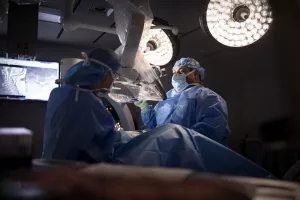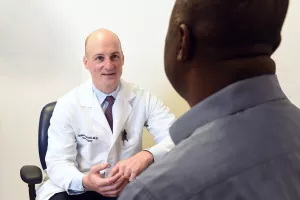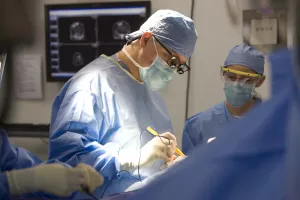When a tumor, aneurysm or other abnormality is in a hard-to-reach place, skull base surgery can help us protect and heal the area near the bottom part of your skull.
What is skull base surgery?
The skull base is a bony structure that forms the bottom of the skull and supports the brain. When tumors or aneurysms develop in the skull base, it can impact your ability to move and think. This area can be difficult to reach because of all the nerves and blood vessels that run through it.
Performing neurosurgery in such a sensitive area comes with risks, and learning that you need skull base surgery can bring a wave of emotions. But we’re here to help you navigate these new waters with proper planning and a skilled, experienced team by your side.
Whenever possible, we use minimally invasive techniques like endoscopes and robotics to remove the tumors affecting your neurological system and get you back to enjoying the quality of life you deserve.

Conditions
Your care team may recommend skull base surgery to treat tumors and other abnormalities along the skull base, ears and around the eyes, including:
Treatments
Skull base surgery is usually just one part of a larger treatment plan that may include medication and radiation therapy. Depending on the location of your tumor, we’ll collaborate with our partners in:
Our teams are in close communication on your health history, condition and treatment plan so we can cover your healthcare from all angles.
Types of skull base surgery
When performing skull base surgery, our top priority is minimizing your potential pain, risks, and recovery time. That's why all of our surgeons specialize in minimally invasive procedures. With tools like catheters, high-definition endoscopes and computer-guided surgical systems, we can make surgical incisions roughly the size of a marble. This allows us to remove tumors while sparing healthy tissue.
If your tumor requires traditional, or "open" surgery, we’ll look after you in our neurosurgical intensive care unit. We specialize in helping people recover from brain surgery safely and comfortably.

From regular office visits to inpatient stays, find the healthcare you need and deserve close to home.

Meet the doctors and care team devoted to supporting you every step of the way along your path to better health.